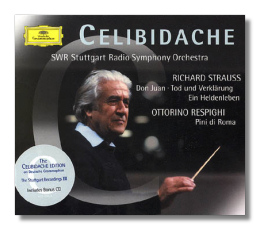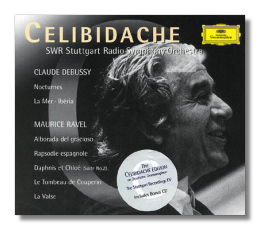
The Internet's Premier Classical Music Source
Related Links
- Latest Reviews
- More Reviews
-
By Composer
-
Collections
DVD & Blu-ray
Books
Concert Reviews
Articles/Interviews
Software
Audio
Search Amazon
Recommended Links
Site News
 CD Review
CD Review
The Celibidache Edition

The Stuttgart Recordings, Volume III
- Richard Strauss:
- Don Juan
- Tod und Verklärung
- Ein Heldenleben
- Ottorino Respighi: Pini di Roma
SWR Stuttgart Radio Symphony Orchestra/Sergiu Celibidache
Deutsche Grammophon 453190-2 ADD 2CDs 69:53, 52:08, plus 37:52 rehearsal disc


The Stuttgart Recordings, Volume IV
- Claude Debussy:
- Nocturnes
- La mer
- Ibéria
- Maurice Ravel:
- Alborada del gracioso
- Rapsodie espagñole
- Daphnis et Chloé: Suite #2
- Le tombeau de Couperin
- La valse
SWR Stuttgart Radio Symphony Orchestra/Sergiu Celibidache
Deutsche Grammophon 453194-2 ADD 3CDs 61:20, 50:00, 52:08, plus 47:59 rehearsal disc
Romanian-born conductor Sergiu Celibidache has become a cult figure because of his very definite beliefs about music. One of those beliefs was that recording music is, in his son's words, "a distorted representation of reality." Celibidache truly believed that LPs and CDs discourage the listener from becoming actively involved with the music; with each audition, the listener's reaction becomes less spontaneous. It is no surprise, then, that Celibidache made very few studio recordings. As copyright on live and broadcast performances expired, labels were quick to "correct" this situation by releasing unauthorized discs of Celibidache's work, and not always in the most responsible manner. Some labels respected the musicianship, but others seemed more interested in making a buck, to the detriment of both the performances and the music itself.
Since Celibidache's death in 1996, his family has taken a pragmatic role in the release of the conductor's live and broadcast performances on CD. Realizing that unauthorized recordings will be released no matter what, his son and wife decided to work with EMI Classics and Deutsche Grammophon to ensure that good and carefully prepared mementos of Celibidache's work became available. As a result, both labels now have a Celibidache series. EMI's contains material mostly from the 1980s, when the conductor was associated with the Munich Philharmonic. Deutsche Grammophon's series contains material mostly from the previous decade, when Celibidache was the artistic director of the SWR Stuttgart Radio Symphony Orchestra. Proceeds form both series will go to two causes. The first, known as The Celibidache Foundation, will focus on nurturing musicians via opportunities for live music-making. The second, S.C. Help, is a humanitarian organization that will benefit people in Tibet, Romania, and other parts of the world. (Celibidache's artistic and humanistic views were greatly influenced by Zen Buddhism.)
Overall, Celibidache's performances are rather slow. La mer lasts just over 28 minutes, and Tod und Verklärung is just under that timing. The first movement of Debussy's Nocturnes weighs in at an astonishing 11 minutes, but how sensuous it is! The slowness is more objective than subjective. Celibidache believed that factors other than the written score's tempo markings must be considered, including the moment to moment complexity of the score, and "epiphenomena" that followed each individual note. His son wrote that "when only a percentage of what existed in the hall can be heard, the tempo on the CD always feels 'too slow." Nevertheless, there are times when he cuts loose, such as in the end of La valse (terrifyingly precipitous here) and at the end of Daphnis et Chloé, which whirls intoxicatingly.
The one word that describes a Celibidache performance best might be "balance." He took infinite pains to ensure that orchestral sections and instruments within a section never dominated each other; the music's strands were never clouded, obscured, or tangled. (One can understand his family's objection to low-quality pirate recordings, given this overwhelming concern for balance.) "Balance" also applies to an emotional state. He abhorred sentimentality, and also gratuitous effects and artificially induced excitement – "let it heat itself up" he said of the music he conducted.
There's not a performance here that is less than excellent. Most of them are memorable because they seem to give the listener a new set of ears with which to hear familiar music. I don't know a more moving (but less self-indulgent) Tod und Verklärung, or a La mer that is more bewitching and pictorial. La valse is at first attractive, then repellent, like a sweet dish that one cannot stop eating. Celibidache frees Ein Heldenleben of self-important pomp and leaves behind the intrinsic nobility of Strauss's conception. And so it goes. No matter how well you know these works, you will be excited and educated by Celibidache's performances.
The Stuttgart Radio Symphony doesn't have the lush sound of the Berlin or Vienna Philharmonic. The playing has character, though, which is a trait one cannot count upon in this age of one size fits all, "you can have it in any color, as long as it's black" orchestral musicianship. I was never bothered by shortcomings in this orchestra's technique or tone.
These are live recordings made between 1973 and 1982. There are audience noises, but not too many (no applause), and a few understandable imperfections. I hear edits in La mer, and yet a single concert date is indicated – two facts I don't know how to reconcile. The sound is uniformly good, though, and while it lacks the ultimate in digital era power at its best, Celibidache's technique compensates for analogue limitations.
Each set contains a "bonus" disc devoted to rehearsal sessions. The Debussy and Ravel set contains nearly 48 minutes of Celibidache rehearsing La mer, and the Strauss and Respighi set contains 26 minutes of a Tod und Verklärung session and 11 minutes of Pini di Roma. Of course everything is in German, so the benefit is small to listeners who don't understand that language. (When EMI included rehearsal excerpts, they included English translations. However, these were not considered "bonuses," at least as far as pricing was concerned.) Nevertheless, it is possible to hear what care Celibidache took with details. These excerpts reveal him to be a superb technician. Although his performances are intensely spiritual, this spirituality was achieved not by flowery words and mystical navel-gazing but by hard work, and by an intimate knowledge of how music and musicians "work." They also reveal him to be a persuasive leader, a man who loved his players and who placed himself among them, not above them. Autocratic rages and selfish bursts of temperament seem not to have been in Celibidache's repertoire.
These two sets get my highest recommendation. Deutsche Grammophon has already released sets devoted to symphonies by Brahms and Bruckner, and to Russian showpieces. I wouldn't miss them for anything!
Copyright © 2000, Raymond Tuttle


















